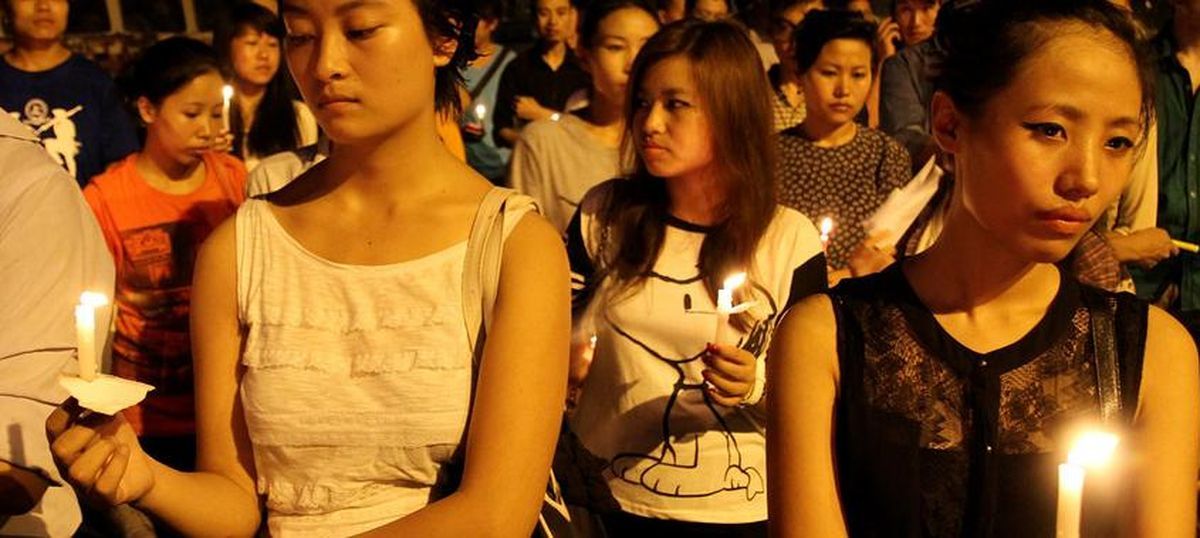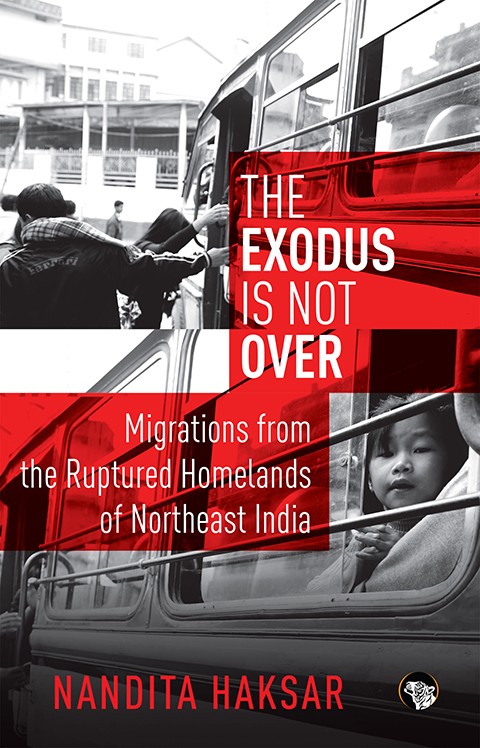Stories of the first generation of migrants from North-East India to different Indian cities.
 October 24, 2009. That is one date Atim will never forget all her life.
October 24, 2009. That is one date Atim will never forget all her life.
She had returned to work at Q’BA after her Goa trip. On that afternoon, the staff had had their tea and she had gone back to the lounge downstairs. There were a few guests at the bar. Suddenly, her mobile rang. She answered. It was Yaokhalek. His voice was shaking. He just said, “Come home fast” and put the phone down. He was living in Vasant Kunj Extension with a group of Tangkhul boys engaged in making special black pots.
Atim wondered what could possibly have happened. Once again her mobile rang. “Something has happened to Ramchanphy. She is not feeling well.”
Ramchanphy was their younger sister. She had just turned nineteen. She had come to Delhi barely a month ago and was perfectly well when Atim had left in the morning. Yaokhalek must have come to meet Ramchanphy. The phone rang once more. It was Yaokhalek again. He said, “The gas cylinder has exploded.”
Atim told the manager she had to go home. He asked what had happened and she replied, “My sister has died.”
Atim had no money in her purse.
She had left Rs 500 with Ramchanphy. She had expected to be dropped home after work, but now she needed to take an auto. Srilata, a co-worker, gave her some money and she quickly got into an auto. Yaokhalek phoned again and she told him she was in an auto on her way home. Atim asked whether there was anyone around to help him. He said Ester and her mother had gone to Sarojini Nagar, but there was a man listening to music standing just outside the room.
Atim phoned Yaronsho and asked him to be with Yaokhalek. She had kept in touch with him ever since they had met at Mayori’s. Atim’s mobile rang again. This time it was Ramchanphy’s boyfriend calling from Ukhrul to say that she was not answering his calls. Atim blurted out, “She is dead.” Then she burst into tears.
By now Atim was howling out loud. When the auto stopped at the traffic lights she was aware that people were staring, but she was beyond caring. She was stuck in the evening traffic. She called her friend Rose, who assured her that she would go to Atim’s flat immediately. It took fifty minutes for Atim to reach Munirka and climb up to her room. By then, many Tangkhuls had already arrived. They were sitting in her room.
Atim looked for the Rs 500 note she had left under her pillow. She also tried to find the mobile phone she had given Ramchanphy, but both were missing. Atim could not make herself go into the kitchen where she knew her sister’s body would be lying.
Yaronsho called the police and they came and took the body away. There were perhaps five hundred Tangkhuls gathered together. They were singing hymns and keeping vigil.
Atim went into Ester’s room next door and lay down. Ramchanphy had arrived in September full of excitement. Atim had picked her up from the airport. The moment they reached the flat, Atim had asked her sister what she had brought from home.
Then the two sisters had taken out the goodies from Ramchanphy’s bag: there was thangching or lotus fruit, sakao or dried beef with smoked chilli powder, fresh umrok, the hottest chillies in the world, and, of course, the delectable ngari or fermented fish without which a chutney did not have the kick; and lots of snails.
Atim felt a pang of guilt.
She had not been able to take her younger sister sightseeing. Work had kept her busy and she returned late every night. Atim had promised to take her out on her next day off.
Ramchanphy was the most beautiful of the four sisters and many boys were interested in her. Atim’s mother had been complaining to Atim that almost every evening young men dropped in and Ramchanphy and her sister Chonsomi would make cups of black tea; this was the traditional courting or the meisum kapam. Atim could imagine the singing and the light-hearted banter and mild flirtation.
Later, when the man and woman were more certain of their feelings, they could go out alone together. Ramchanphy had already decided on the man, but her mother did not approve of him and so she had encouraged her daughter to visit Delhi.
The previous night Atim and Ramchanphy had lain side-by-side and chatted the whole night. It was mostly Ramchanphy telling her elder sister stories. Atim felt she could not share her experiences because her sister would not understand the world she lived in, but she was very pleased when Ramchanphy told her that ever since Atim had started sending money they did not have to go begging for rice anymore.
Ramchanphy had spent some time in Nagaland and she had many anecdotes to share.
She had gone there with a woman who was a distant relative and who was married to a man from the Pochury Naga tribe; earlier they had lived in Greenland, the locality where Atim’s family was living. When the couple shifted to Kohima they took Ramchanphy with them to help with the housework. After living in Kohima for some time the family had moved to a Pochury village in Phek District.
Ramchanphy told Atim that the family had pork to eat for lunch and dinner every single day! And their barn was full of smoked pork. She used to go to the paddy field and there she saw a lot of fruit trees growing, especially bananas. The Pochury man’s mother was very kind to Ramchanphy and had presented her with a chamthei, a valuable bead used in the kongsang, the traditional Tangkhul necklace. While there, she had also picked up the Pochury language.
Then Ramchanphy had regaled Atim with ghost stories. One was about parents who came to pick up their daughter from school after it had closed for the vacations. The girl was in the toilet and the chowkidar had locked it from the outside. The parents went away, thinking their daughter had left without them. When the school reopened, they found her body in the toilet; she haunts the school.
Atim smiled through her tears. She could hear Ramchanphy’s voice. How they had laughed together over silly jokes and shared life experiences. Atim had come away to Delhi and so had missed seeing her sister grow up; Ramchanphy was much closer to Chonsomi, but here in Delhi they had become closer.
Atim remembered how Ramchanphy had cooked the peacock meat Yaokhalek’s friends had brought for the younger sister. Ever since she had come to Delhi, Ramchanphy would cook for Atim. It had been so nice to come home every evening to a warm meal and a sister to chat with instead of an empty room. Again Atim felt a pang of guilt. She had not taken a single photo of Ramchanphy in Delhi.
In the morning, Atim forced herself to go to the kitchen; she saw the broken tube and two boiled eggs and rice. She must have been cooking when the gas cylinder burst. She had taken out the old rice and must have been about to cook it for Atim. The tears just flowed down her cheeks.
Yaokhalek took her hand and they went to Safdarjung Hospital. Ramchanphy’s body had been taken there and the family members were requested to remove her clothes so that a post mortem could be conducted. Atim saw how badly her sister’s stomach had been burnt, and her tongue and neck and hair were also burnt. What a terrible death.
 Excerpted with permission from The Exodus Is Not Over: Migrations From The Ruptured Homelands Of NorthEast India, Nandita Haksar, Speaking Tiger Books.
Excerpted with permission from The Exodus Is Not Over: Migrations From The Ruptured Homelands Of NorthEast India, Nandita Haksar, Speaking Tiger Books.
Source: http://scroll.in



